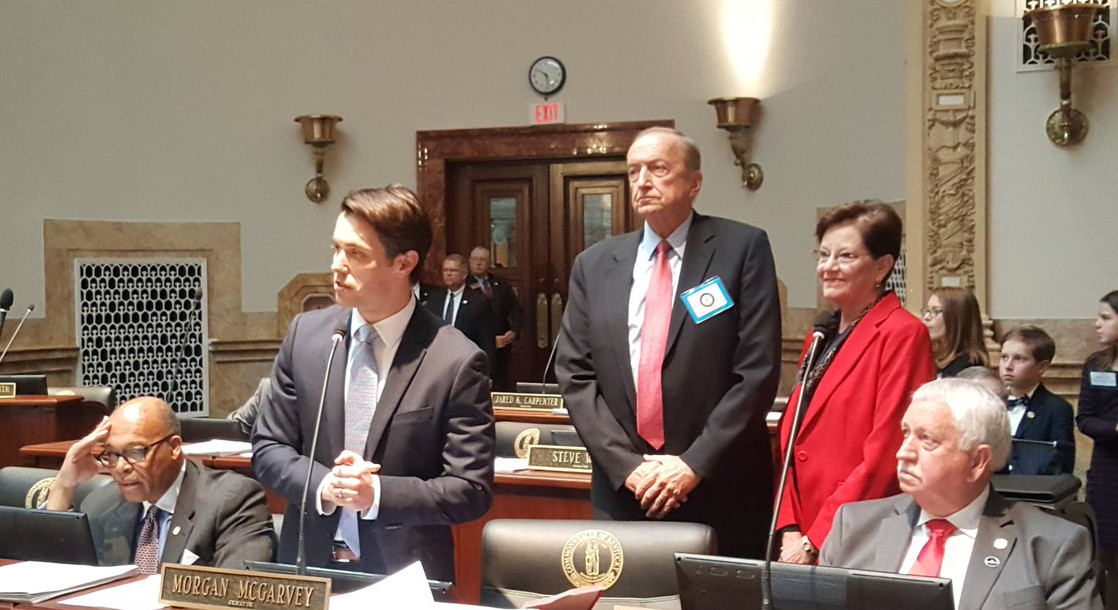Photo via FatCamera
As more states move to open access to medical and recreational cannabis, municipalities around the country are struggling to reconcile the horrific effects of America’s drug war with the new push to license and tax the once-outlawed plant. In Oakland, California and Maryland, social justice-minded regulators have made efforts to set aside a portion of permits for residents previously prosecuted for cannabis crimes, while California’s state-level program helps residents expunge marijuana-related crimes from their criminal records. In Ohio, though, where state regulators recently finished screening 109 applications from hopeful ganjapreneurs, one prospective cultivator is blaming his failed bid for a growing license on an application grader’s criminal past, bringing the same dangerous mentality of the War on Drugs into the one industry actively trying to right those historic wrongs.
According to the Cincinnati Enquirer, Jimmy Gould, chairman and CEO of CannAscend, conducted his own internal background checks of Ohio’s application reviewers after being denied a “Level 1” cultivators’ license, and discovered that Trevor Bozeman — owner of iCann Consulting, one of the contractors responsible for scoring the license applications — had pled guilty to a marijuana-related felony in 2005 (when he was 20 years old) for possession of a controlled substance with intent to manufacture or distribute, for which he was only sentenced to three years’ probation.
Since the discovery, Gould and his partners have threatened to appeal their application denial specifically because of Bozeman’s criminal record, arguing that his rap sheet should have disqualified him from the regulatory position, or at least been disclosed to Buckeye State applicants.
“The State of Ohio has a lot of explaining to do: After giving vendors 10 days to reply to an [Request for Proposal] for the Medical Marijuana Control Program, they hired a convicted drug dealer for $150,000 to score applications for the Ohio Medical Marijuana industry," Gould said in a statement Tuesday.
Of course, some would argue that Bozeman’s decade-old run in with Johnny Law has no intrinsic bearing on his ability to screen prospective medical marijuana cultivators, and Ohio Department of Commerce representatives were quick to defend their application process.
“The Ohio Department of Commerce conducted a comprehensive, fair, and impartial evaluation of all applications," the agency said in a statement.
Even without a single plant in the ground, Gould is not new to failures in Ohio’s still-infant medical marijuana industry. Gould is the founder of ResponsibleOhio, and in 2015 authored the group’s first legalization effort — a controversial ballot measure that would have created a corporate monopoly for only a few select cultivators and distributors, which eventually was shot down by voters. Medical cannabis was instead legalized by Ohio’s state legislature the following year.
After Gould’s 2015 legalization attempt was rejected, advocacy group Legalize Ohio 2016 released a harsh statement supporting the voters’ choice to reject the legalized cannabis monopoly: “…Ohioans are overwhelmingly in favor of legalization, but this year’s initiative failed because a greed-driven monopoly plan is wrong for the state of Ohio.”
Yet Gould’s current argument appears to have caught the attention of other, more prominent Ohioans. The Cleveland Plain Dealer reports that Ohio Lieutenant Governor Mary Taylor stated Tuesday that, "As a mother who has struggled with addiction in my own family, I am outraged that a convicted drug dealer played a major role in determining who was suitable to receive a license. At a minimum, the integrity of the process has been called into question and it is unconscionable to imagine that this process would be allowed to continue until we have a full reckoning."
But even in the face of a public rebuke from one of the state’s highest offices, Ohio regulators are sticking by their guns, excusing Gould’s uproar as simply sour grapes.
"Obviously, we're not surprised to learn that people who applied and didn't get a license are disappointed," Department of Commerce spokeswoman Stephanie Gostomski told the Plain Dealer. "Any applicant who did not receive a license has the right to appeal the decision if they so choose."
Despite their denial of CannAscend, Bozeman and his regulatory partners did license 12 Ohio businesses to grow state-approved cannabis — a huge step for Ohio’s long-awaited medical marijuana industry, with legal cannabis sales expected to start in September 2018.











